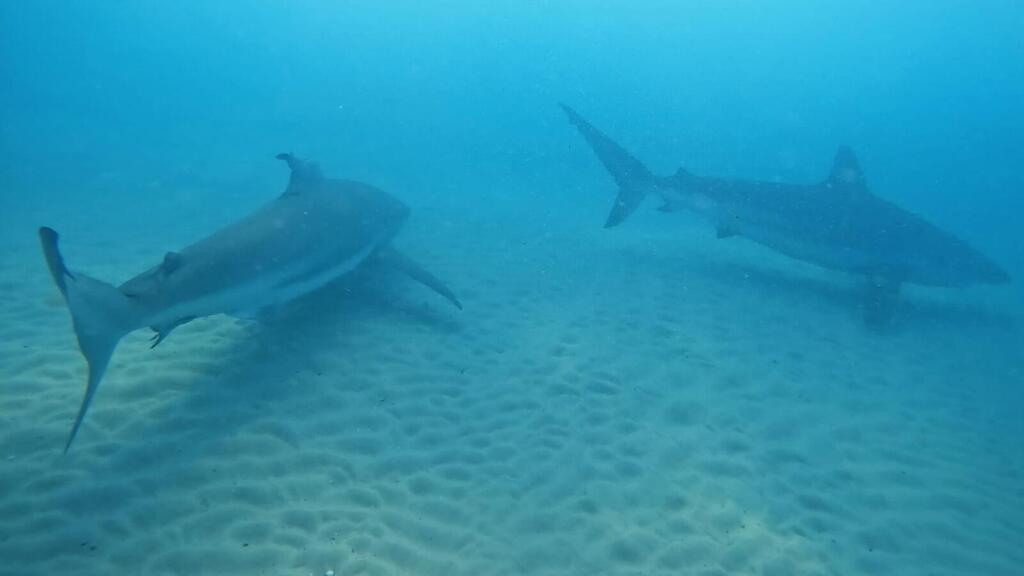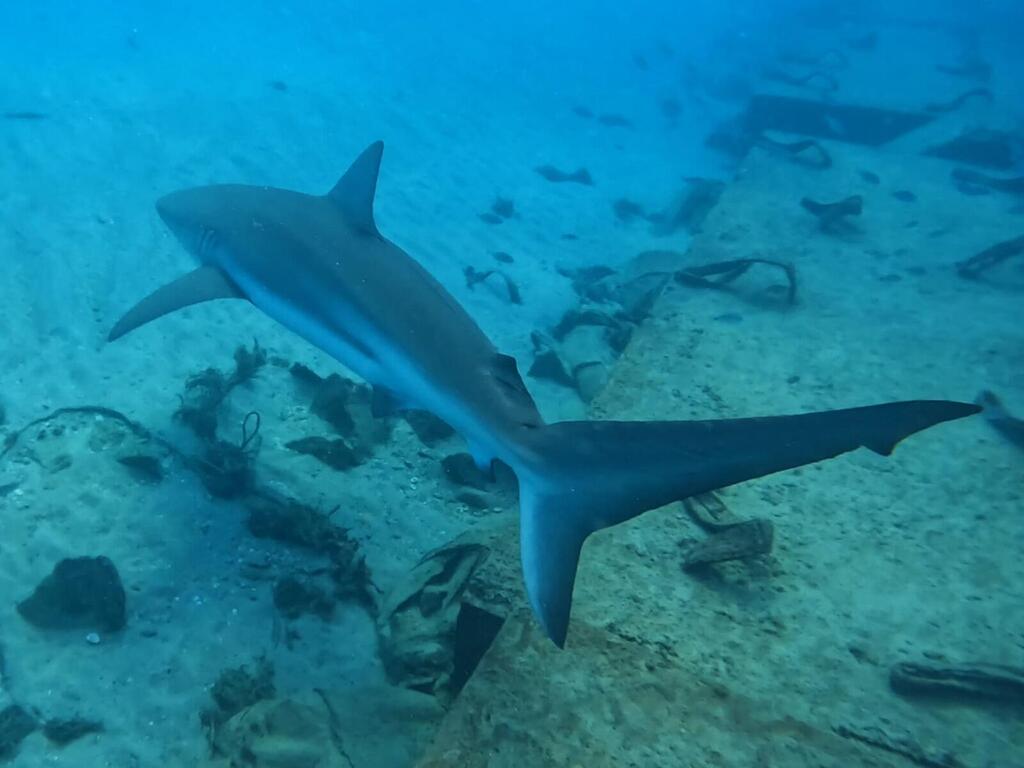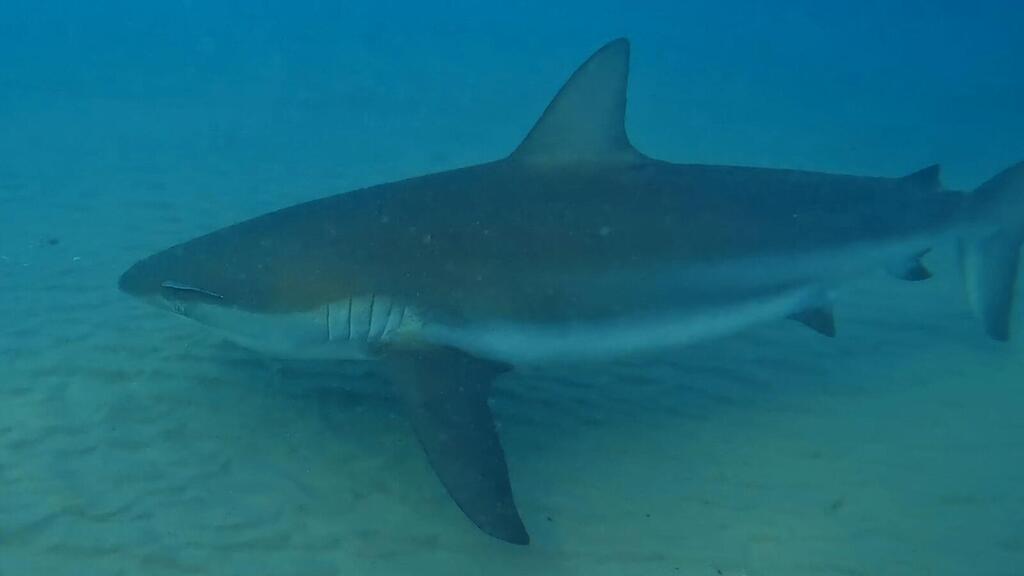Getting your Trinity Audio player ready...
Sharks, it appears, inhabit the Mediterranean waters off the coast of central Israel.
Every year, from autumn to spring, as sea temperatures cool, dozens of endangered sandbar and dusky sharks gather in the shallow waters near the Orot Rabin power station in Hadera. Last week, the first sharks of the season were documented in Hadera by Ofer Shefer. The Society for the Protection of Nature in Israel (SPNI) notes that this is a unique and rare phenomenon globally, attracting many curious visitors, but it is currently unregulated.
Sharks off the coast
(Photo: Ofer Shefer)
This is concerning because, due to unregulated human activities in the ocean, particularly from targeted or incidental fishing, approximately 100 million sharks are caught globally each year, including in the Mediterranean.
Alon Rothschild, director of The Blue Half – the marine program of the SPNI - said that it is exciting for Israelis to see the sharks up close. "In Hadera, the sharks come for an especially long visit, and human activity is very high – Israelis come to dive and snorkel, use paddleboards, kayaks and motorized boats. The experience of watching a large predator close to the shore is fascinating and exciting, and it is important to allow the public to observe this unique phenomenon," he said.
"However, we have been warning for several years that the shark gathering site in Hadera is unmanaged and unregulated, posing a significant risk to both sharks and humans," Rothschild added.
According to Rothschild, "the risk to sharks primarily arises from the fact that fishing activities, especially from the shore with rods, are allowed in the area. Sharks get caught on hooks occasionally, and since they are a protected natural value, this is an incident that needs to be prevented."
"Fishing activities also endanger divers and snorkelers who come to observe the phenomenon, as people occasionally get caught on hooks too. When combined with the density of users at the site, poor underwater visibility, and unexpected currents from the power station's outlet, it becomes a site with considerable safety risks," he said.
The person who documented the sharks is Ofer Shefer, a 50-year-old from Atlit, who has been snorkeling in Hadera for several years. "My buddy Ilan Bronekash and I saw three sandbar sharks; it seems the dusky sharks haven't arrived yet. As always, it's an experience to encounter them at the 'start of the season,' and they don't seem particularly excited by us," Shefer said.
"I love the snorkeling experience with the sharks and, of course, it's advisable to know the site, currents, scattered fishing lines, keep a distance from the sharks and give them their space, as we are the 'tourists' in their environment. The sharks – despite their reputation, and especially the types of sharks in Hadera – are not considered dangerous, but like any wild animal in its environment, a cautious approach should be taken, not touching or disturbing them."
The SPNI emphasizes that the fundamental principles for regulating the safety of sharks and humans in this confined space include a seasonal arrangement required only during the months of gatherings, science-based management, legal authority for management, and effective monitoring and enforcement capabilities.
The optimal management alternative is a seasonal declaration of the site as a "protected natural area" by the Minister of Environmental Protection, with the Nature and Parks Authority managing the site during the relevant season. This is because only they have the ability to effect maritime supervision, scientific knowledge, and legal authority to manage the site, provided it is declared as a site managed by the authority and adequately funded.
"Additionally, fishing from the sea and shore during the shark season should be prohibited, human activity in the area should be limited to allow free movement of the sharks, divers should be kept away from the dangerous cooling water current, and overlap between different leisure activities should be regulated," according to Rothschild.
"Furthermore, motorized boating should be kept more than 330 yards from the shoreline, in accordance with existing law, to prevent collisions between boats and divers or snorkelers, and a shark observation area from the shore, should be defined at a strategic and attractive point," he added.
Dr. Aviad Cheinin, head of the top predators program at the Morris Kahn Marine Research Station, Charney School of Marine Sciences at the University of Haifa, said, "The gathering of sharks at the warm water outlets of power stations in Hadera, Ashdod and Ashkelon are important attraction points for sharks during the winter. These sites provide an opportunity for systematic and vital research on sharks that are endangered in the Mediterranean, and information about them is scarce. Regular monitoring and regulation of these unique gatherings are crucial for their conservation and survival."
The tension between development and conservation at sea will be discussed at the "Blue Economy and the Marine Environment: Threats and Opportunities" conference, dedicated entirely to the tension between economic development and protection of the marine environment and landscape, to be held on November 28.
"Besides regulating the shark gathering site in Hadera, the SPNI continues to promote the completion of sustainable fishing reform in Israel, primarily by completely halting trawl fishing in Israel, with appropriate compensation for fishermen and ensuring a ban on fishing during fish breeding season. Additionally, a plan for nature reserves in Israel's economic waters is being advanced to protect unique habitats that include special marine animals and rare natural phenomena," Rothschild concluded.
Get the Ynetnews app on your smartphone:







